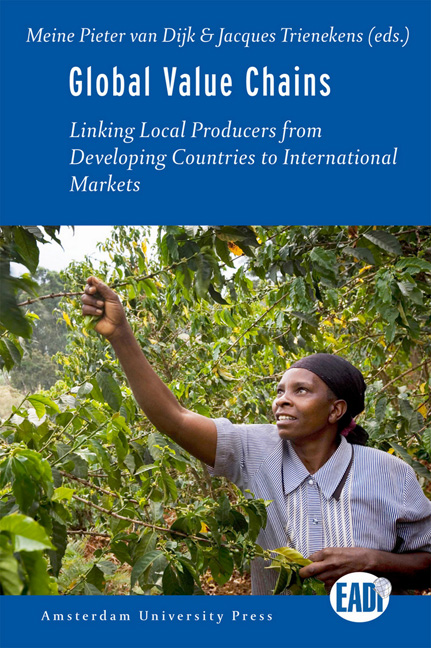Book contents
- Frontmatter
- Contents
- Part I Theoretical Contributions
- Part II Local Agricultural Value Chains
- Part III International Agricultural Value Chains
- Part IV Value Chains in the Industrial and Services Sector
- Part V Conclusions: Upgrading Value Chains in Developing Countries
- About the Authors
- Index
- Miscellaneous Endmatter
6 - Localizing Global Standards: Illustrative Examples From Kenya's Horticulture Sector
Published online by Cambridge University Press: 19 January 2021
- Frontmatter
- Contents
- Part I Theoretical Contributions
- Part II Local Agricultural Value Chains
- Part III International Agricultural Value Chains
- Part IV Value Chains in the Industrial and Services Sector
- Part V Conclusions: Upgrading Value Chains in Developing Countries
- About the Authors
- Index
- Miscellaneous Endmatter
Summary
Introduction
Farmers in developing countries increasingly need to comply with a bewildering array of standards and codes of conduct in order to be able to export. These standards encompass a wide range of quality, health, environmental and ethical concerns, implemented either as mandatory public standards or as voluntary private standards. Standards diverge in terms of compliance requirements and certification practices, and especially private voluntary standards frequently change over time. Until recently, standard setting and certification were primarily seen as technocratic processes to ensure more quality-conscious and sustainable production processes. However, standard setting and certification processes are also an important governance mechanism in the sourcing strategies of lead firms. There is an increasing concern that so-called global standards, developed explicitly and implicitly along Northern priorities and ways of thinking, fail to incorporate Southern stakeholders’ views (Tallontire, 2007; Blowfield and Dolan, 2008; Riisgard, 2008). Standards are seen as formulated without consideration of the prevailing conditions in developing countries, creating a situation in which producers do not really understand and cannot internalize these standards. Standards can then become just another Northern tool that Southern producers need to implement in order to ensure (continued) market access, instead of becoming a tool that may offer substantial developmental benefits.
This chapter investigates the potential for adapting global standards to national circumstances in horticulture (cut flowers and fresh fruits and vegetables) value chains in Kenya. First, Section 2 will outline our conceptual framework, explaining the contested role of standards in development processes. Next, Section 3 introduces the Kenyan horticulture industry, after which Section 4 presents data on how different certification mechanisms can at least partly avoid a major potential disadvantage of standardization: the exclusion of smaller producers. Section 5 presents two recent attempts at localizing global standards, on involving a mandatory public standard and one voluntary private standard. The final section presents our conclusions.
Global standards and localized development
This section briefly outlines our conceptual framework. Within development studies, two opposite perspectives exist on the developmental relevance of standards. The first focuses on the exclusionary effects of standards, stressing that many developing countries simply lack the administrative, technical and scientific capacities to comply with emerging requirements, presenting potentially insurmountable barriers to trade in the short or medium term.
- Type
- Chapter
- Information
- Global Value ChainsLinking Local Producers from Developing Countries to International Markets, pp. 119 - 136Publisher: Amsterdam University PressPrint publication year: 2012
- 1
- Cited by



